- Home
- Hermann Hesse
The Glass Bead Game Page 12
The Glass Bead Game Read online
Page 12
With a small sigh the Magister ceased pacing the room. "That is what happened to me, and to this day I am still a little ashamed to talk about it. But the fact is, Joseph, that the more we demand of ourselves, or the more our task at any given time demands of us, the more dependent we are on meditation as a wellspring of energy, as the ever-renewing concord of mind and soul. And--I could if I wished give you quite a few more examples of this--the more intensively a task requires our energies, arousing and exalting us at one time, tiring and depressing us at another, the more easily we may come to neglect this wellspring, just as when we are carried away by some intellectual work we easily forget to attend to the body. The really great men in the history of the world have all either known how to meditate or have unconsciously found their way to the place to which meditation leads us. Even the most vigorous and gifted among the others all failed and were defeated in the end because their task or their ambitious dream seized hold of them, made them into persons so possessed that they lost the capacity for liberating themselves from present things, and attaining perspective. Well, you know all this; it's taught during the first exercises, of course. But it is inexorably true. How inexorably true it is, one realizes only after having gone astray."
This story had just enough effect upon Joseph for him to apprehend the risk he himself was running, so that he turned to his meditation exercises with renewed seriousness. What really impressed him was the fact that the Master had for the first time revealed to him something of his personal life, of his youth and early studies. For the first time Joseph fully realized that even a demigod, even a Master, had once been young and capable of erring. He felt gratitude, too, for the confidence the revered Master had placed in him by making this confession. It was possible for one to go astray, to flag, to make mistakes, to break rules, and still to deal with all such difficulties, to find one's way back, and in the end even to become a Master. Joseph overcame the crisis.
During the two or three years at Waldzell during which the friendship between Plinio and Joseph continued, the school watched the spectacle of these combative friends like a drama in which everyone had at least some small part, from the headmaster to the youngest freshman. The two worlds, the two principles, had become embodied in Knecht and Designori; each stimulated the other; every disputation became a solemn and symbolic contest which concerned everyone at the school. From every contact with his native soil on the holiday visits home Plinio would bring back new energy; and from every withdrawal for reflection, from every new book, every meditation exercise, every meeting with the Magister Musicae Joseph also derived new energy, made himself better fitted to be the representative and advocate of Castalia. As a child he had experienced his first vocation. Now he experienced the second. These years shaped and forged him into the perfect Castalian.
He had also some time ago completed his elementary lessons in the Glass Bead Game and even then, during holidays and under the eye of a Games Director, had begun sketching out his own Glass Bead Games. In this activity he now discovered one of the most abundant sources of joy and relaxation. Not since he had insatiably practiced harpsichord and piano pieces with Carlo Ferromonte had anything done him so much good, so refreshed, strengthened, reassured, and delighted him as did these first advances into the starry firmament of the Glass Bead Game.
During these same years young Joseph Knecht wrote those poems which have been preserved in Ferromonte's copy. It is quite possible that there were originally more of them than have come down to us, and it may be assumed that the poems, the earliest of which dates back to a time before Knecht's introduction to the Glass Bead Game, helped him to carry out his role and to withstand the many tests of those critical years. Here and there in these poems, some skillfully wrought and some hastily scribbled, every reader will discover traces of the profound upheaval and crisis through which Knecht was then passing under the influence of Plinio. A good many of the lines sound a note of profound disturbance, of fundamental doubts about himself and the meaning of his life--until, in the poem entitled "The Glass Bead Game" he seems to have attained belief and surrender. Incidentally, a measure of concession to Plinio's world, an element of rebellion against certain unwritten laws of Castalia, is contained in the mere fact that he wrote these poems and even on occasion showed them to several schoolmates. For while Castalia has in general renounced the production of works of art (even musical production is known and tolerated there only in the form of stylistically rigid composition exercises), writing poetry was regarded as the most impossible, ridiculous, and prohibited of conceivable acts. Thus these poems were anything but a game, anything but an idle calligraphic amusement; it took high pressure to start this flow of productivity, and a certain defiant courage was required to admit to the writing of these verses.
It should also be mentioned that Plinio Designori likewise underwent considerable change and development under the influence of his antagonist. This was reflected in more than the refinement of his methods of argument. During the comradely rivalry of those school years Plinio saw his opponent steadily rising and maturing into an exemplary Castalian. The figure of his friend more and more vigorously and vividly embodied for him the spirit of the Province. Just as he himself had infected Joseph with some of the atmospheric turbulence of his own world, he for his part inhaled the Castalian air and succumbed to its charm and power. In his last year at the school, after a two-hour disputation on the ideals and perils of monasticism, fought out in the presence of the highest Glass Bead Game class, Plinio took Joseph out for a walk and made a confession to him. We quote it from a letter of Ferromonte's:
"Of course I've known for a long time, Joseph, that you are not the credulous Glass Bead Game player and Castalian saint whose part you have been playing so splendidly. Each of us stands at an exposed spot in this battle, and each of us probably knows that what he is fighting against rightfully exists and has its undeniable value. You yourself take the side of intensive cultivation of the mind, I the side of natural life. In our contest you have learned to track down the dangers of the natural life and have made them your target. Your function has been to point out how natural, naive living without discipline of the mind is bound to become a mire into which men sink, reverting to bestiality. And I for my part must remind you again and again how risky, dangerous, and ultimately sterile is a life based purely upon mind. Good, each defends what he believes to be primary, you mind and I nature. But don't take offense--it sometimes seems to me that you actually and naively consider me an enemy of your Castalian principles, a fellow who fundamentally regards your studies, exercises, and games as mere tomfoolery, even though he briefly joins in them for one reason or another. How wrong you would be if you really believed that, my friend. I'll confess to you that I am infatuated with your hierarchy, that it often enthralls me like happiness itself. I'll confess to you that some months ago, when I was at home with my parents for a while, I had it out with my father and won his permission for me to remain a Castalian and enter the Order if this should be my desire and decision at the end of my schooldays. I was happy when he at last gave his consent. As it happens, I shall not make use of his permission; I've recently realized that. Not that I've lost my taste for it, not at all. But I more and more see that for me to remain among you would mean escaping. It would be a fine, a noble escape perhaps, but still an escape. I shall return and become a man of the outside world, but one who continues grateful to your Castalia, who will go on practicing a good many of your exercises, and will come every year to join in the celebration of the great Glass Bead Game."
Knecht informed his friend Ferromonte of Plinio's confession with deep emotion. And Ferromonte himself added, in the letter we have just cited: "To me, as a musician, this confession of Plinio, to whom I had not always been entirely fair, was like a musical experience. The contrast of world and Mind, or of Plinio and Joseph, had before my eyes been transfigured from the conflict of two irreconcilable principles into a double concerto."
When
Plinio had come to the end of his four-year course and was about to return home, he brought the headmaster a letter from his father inviting Joseph Knecht to spend the coming vacation with him. This was an unusual proposal. Leaves for journeys and stays outside the Pedagogic Province did exist, chiefly for purposes of study. They were not so very rare, but were exceptional and generally granted only to older and more seasoned researchers, never to younger students still at school. But since the invitation had come from so highly esteemed a family and personage, Headmaster Zbinden did not presume to reject it on his own, but presented it to a committee of the Board of Educators. The reply was a laconic refusal. The friends had to say good-by to each other.
"We'll try the invitation again sometime," Plinio said. "Sooner or later it will work out. You must someday see my home and meet my family, and realize that we are not just commercial-minded scum. I shall miss you very much. And make sure, Joseph, that you rise quickly in this complicated Castalia of yours. Of course you're highly suited to become a member of the hierarchy, but in my opinion more at the top than the bottom of the heap--in spite of your name. I prophesy a great future for you; one of these days you'll be a Magister and be counted among the illustrious."
Joseph gave him a sad look.
"Go ahead and make fun of me," he said, struggling with the emotion of parting. "I am not so ambitious as you, and if I should ever attain to some office, you will long since have become president or mayor, university professor or deputy. Think kindly of us, Plinio, and of Castalia; don't become entirely estranged from us. After all, there have to be a few people in the outside world who know more about Castalia than the jokes they make about us out there."
They shook hands, and Plinio departed.
For his last year in Waldzell, Joseph remained out of the limelight. His exposed and strenuous function as a more or less public personality had suddenly come to an end. Castalia no longer needed a defender. Joseph devoted his free time during that year chiefly to the Glass Bead Game, which enthralled him more and more. A notebook of jottings from that period, dealing with the meaning and theory of the Game, begins with the sentence: "The whole of both physical and mental life is a dynamic phenomenon, of which the Glass Bead Game basically comprehends only the aesthetic side, and does so predominantly as an image of rhythmic processes."
THREE
Years of Freedom
Joseph Knecht was about twenty-four years old at this time. With graduation from Waldzell, his school days were over, and there now began his years of free study. With the exception of his uneventful boyhood in Eschholz, these were probably the most serene and happy years of his life. There is, after all, always something wonderful and touchingly beautiful about a young man, for the first time released from the bonds of schooling, making his first ventures toward the infinite horizons of the mind. At this point he has not yet seen any of his illusions dissipated, or doubted either his own capacity for endless dedication or the boundlessness of the world of thought.
Especially for young men with gifts like those of Joseph Knecht, who have not been driven by a single talent to concentrate on a specialty, but whose nature rather aims at integration, synthesis, and universality, this springtide of free study is often a period of intense happiness and very nearly of intoxication. Were it not preceded by the discipline of the elite schools, by the psychic hygiene of meditation exercises and the lenient supervision of the Board of Educators, this freedom would even be dangerous for such natures and might prove a nemesis to many, as it used to be to innumerable highly gifted young men in the ages before our present educational pattern was set, in the pre-Castalian centuries. The universities in those days literally swarmed with young Faustian spirits who embarked with all sails set upon the high seas of learning and academic freedom, and ran aground on all the shoals of untrammeled dilettantism. Faust himself, after all, was the prototype of brilliant amateurishness and its consequent tragedy.
In Castalia, as it happens, the intellectual freedom of the student is infinitely greater than it ever was at the universities of earlier ages, since the available materials and opportunities for study are far ampler. Moreover, studies in Castalia are in no way restricted or colored by material considerations, by ambition, timidity, straitened circumstances of the parents, prospects for livelihood and career, and so on. In the academies, seminars, libraries, archives, and laboratories of the Pedagogic Province every student is completely equal, no matter what his origins and prospects. The hierarchy grades the student solely by his qualities of mind and character. On the other hand most of the freedoms, temptations, and dangers to which so many talented youths succumb at the secular universities simply do not exist in Castalia. Not that there is a dearth of danger, passion, and bedazzlement there--how could these elements ever be completely absent from human life? But at least certain opportunities for going off the rails, for disappointment and disaster, have been eliminated. There is no danger of the Castalian student's becoming a drinker. Nor can he waste the years of his youth in tomfoolery, or the empty braggadocio of secret societies, as did some generations of students in olden times. Nor is he apt to make the discovery someday that his degree was a mistake, that there are gaps in his preparatory education which can never be filled. The Castalian order of things protect him against such blunders.
The danger of wasting himself on women or on losing himself in sports is also minimal. As far as women are concerned, the Castalian student is not subject to the temptations and dangers of marriage, nor is he oppressed by the prudery of a good many past eras which imposed continence on students or else made them turn to more or less venal and sluttish women. Since there is no marriage for the Castalians, love is not governed by a morality directed toward marriage. Since the Castalian has no money and virtually no property, he also cannot purchase love. It is customary in the Province for the daughters of the citizenry not to marry early, and in the years before marriage they look upon students and scholars as particularly desirable lovers. The young men, for their part, are not interested in birth and fortune, are prone to grant at least equal importance to mental and emotional capacities, are usually endowed with imagination and humor and, since they have no money, must make their repayment by giving more of themselves than others would. In Castalia the sweetheart of a student does not ask herself: will he marry me? She knows he will not. Actually, there have been occasions when he did; every so often an elite student would return to the world by way of marriage, giving up Castalia and membership in the Order. But these few, rare cases of apostasy in the history of the schools and of the Order amount to little more than a curiosity.
After graduation from the preparatory schools the elite student truly enjoys a remarkable degree of freedom and self-determination in choosing among the fields of knowledge and research. Unless a student's own talents and interests dictate natural bounds from the start, the only limit on this freedom is his obligation to present a plan of study for each semester. The authorities oversee the execution of this plan in only the mildest way. For young men of versatile talents and interests--and Knecht was one of these--the scope thus allowed him is wonderfully enticing and a source of continual delight. The authorities permit such students, if they do not drift into sheer idleness, almost paradisiacal freedom. The student may dabble in all sorts of fields, combine the widest variety of subjects, fall in love with six or eight disciplines simultaneously, or confine himself to a narrower selection from the beginning. Aside from observing the general rules of morality that apply to the whole Province and the Order, nothing is asked of him except presentation once a year of the record of the lectures he has attended, the books he has read, and the research he has undertaken at the various institutes. His performance comes in for closer check only when he attends technical courses and seminars, including courses in the Glass Bead Game and at the Conservatory of Music. Here every student has to take the official examinations and write the papers or do the work required by the head of the seminar, as is only natural
. But no one forces him to take such courses. For semesters or for years he may, if he pleases, merely make use of the libraries and listen to lectures. Students who take a long while before deciding upon a single field of knowledge thereby delay their admission into the Order, but the authorities show great patience in allowing and even encouraging their explorations of all possible disciplines and types of study. Aside from good moral conduct, nothing is required of them except the composition of a "Life" every year.
It is to this old and much-mocked custom that we owe the three "Lives" by Knecht written during his years of free study. These were, then, not a purely voluntary and unofficial, not to say secret and more or less illicit kind of literary activity, such as his poems written at Waldzell had been, but a normal and official assignment. Far back in the earliest days of the Pedagogic Province the custom had arisen of requiring the younger students, those who had not yet been admitted to the Order, to compose from time to time a special kind of essay or stylistic exercise which was called a "Life." It was to be a fictitious autobiography set in any period of the past the writer chose. The student's assignment was to transpose himself back to the surroundings, culture, and intellectual climate of any earlier era and to imagine himself living a suitable life in that period. Depending on the times and the fashion, imperial Rome, seventeenth-century France, or fifteenth-century Italy might be the period most favored, or Periclean Athens or Austria in the time of Mozart. Among language specialists it had become the custom to compose their imaginary biographies in the language of the country and the style of the period in which they were best versed. Thus there had been highly ingenious Lives written in the style of the Papal Curia at Rome around the year 1200, in monastic Latin, in the Italian of the "Cento Novelle Antiche," in the French of Montaigne, and the baroque German of Martin Opitz.

 Beneath the Wheel
Beneath the Wheel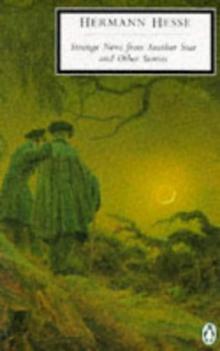 Strange News From Another Star
Strange News From Another Star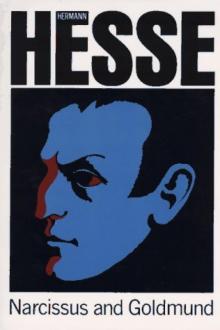 Narcissus and Goldmund
Narcissus and Goldmund Steppenwolf
Steppenwolf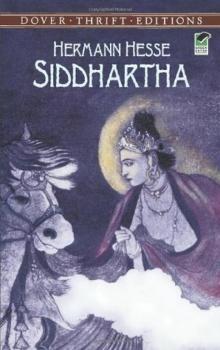 Siddhartha
Siddhartha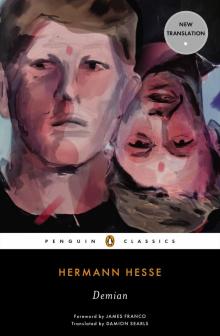 Demian
Demian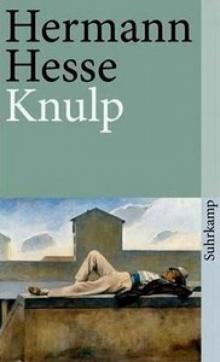 Knulp
Knulp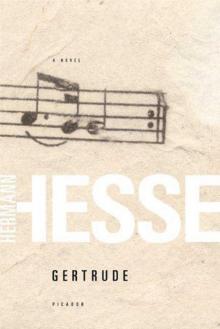 Gertrude
Gertrude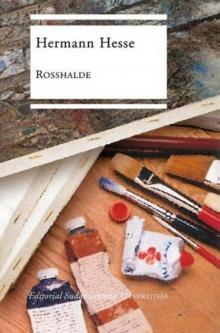 Rosshalde
Rosshalde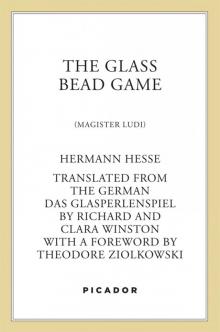 The Glass Bead Game
The Glass Bead Game The Journey to the East
The Journey to the East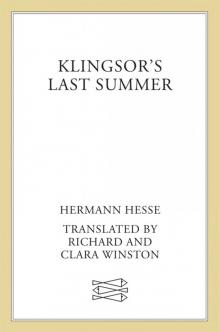 Klingsor's Last Summer
Klingsor's Last Summer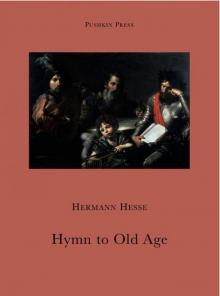 Hymn to Old Age
Hymn to Old Age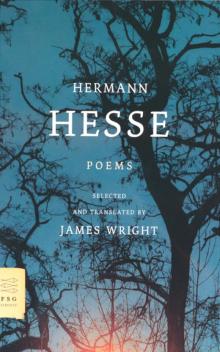 Poems
Poems The Fairy Tales of Hermann Hesse
The Fairy Tales of Hermann Hesse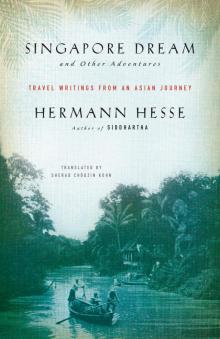 Singapore Dream and Other Adventures
Singapore Dream and Other Adventures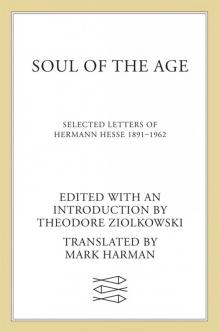 Soul of the Age
Soul of the Age